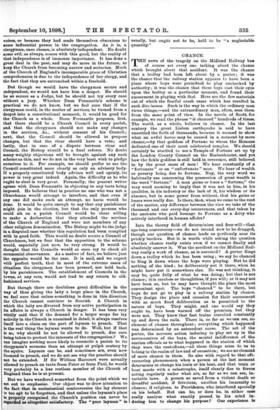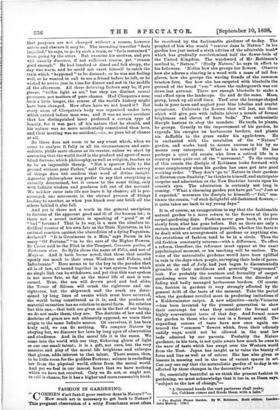CHANCE.
THE news of the tragedy on the Midland Railway has of course set every one talking about the chance which brought about that accident. It was the chance that a trolley had been left about by a porter ; it was the chance that the railway station appears to have been a place where boys were permitted to play unchecked by authority ; it was the chance that these boys cast their eyes upon the trolley at a particular moment, and found their amusement in playing with that. Here are the few materials out of which the fearful crash came which has resulted in such dire issues. Such is the way in which the ordinary man views things,—and the extraordinary man, often, sees them from the same point of view. In the novels of Scott, for example, we read the phrase "it chanced" hundreds of times. The world, as a whole, believes in chance. In the last century the great Lisbon earthquake is said to have unsettled the faith of thousands, because it seemed to show what an awful havoc may be caused in a moment by mere chance,—by that goddess of Fortune to whom the Romans dedicated one of their most celebrated temples. We should certainly be startled to see a Temple of Fortune set up by the London County Council on the Embankment, and yet how the fickle goddess is still held in reverence, still believed in by the great mass of men ! We hear constantly of a " fortunate " or an " unfortunate " man. We hear of wealth or poverty being due to fortune. Nay, the very word we habitually use concerning the possession of great wealth is the word "fortune." A man gains or loses a "fortune," the very word seeming to imply that it was not in him, in his qualities, in his industry or the lack of it, his wisdom or its absence, but in some power from without, that his gains or losses were really due. Is there, then, when we come to the root of the matter, any difference between the view we take of the thousand and one every-day occurrences, and that taken by the ancients who paid homage to Fortune as a deity who actively interfered in human affairs?
Into the thorny field of determinism and free-will—that age-long controversy—we do not intend now to be dragged, though our question of chance leads us perilously near its prickly borders. But it is worth while asking the question whether chance really exists even if we cannot finally and absolutely answer it. Was the accident on the Midland Rail- way really a work of chance, as is assumed ? A porter flings down a trolley which he has been using ; we say he chanced to fling it down where the boys were playing. But he did nothing of the kind ; he deliberately put it there, when he might have put it somewhere else. He was not thinking, it may be, quite fully of what he was doing; but that is not chance ; it is careless or thoughtless, if you will; or it may not have been so, but he may have thought the place the most convenient spot. The boys " chanced " to be there, but boys do not go to play in a railway station by chance. They design the place and occasion for their amusement with as much fixed deliberation as is permitted to the nature of boys. They might, and one would say they ought to, have been warned off the premises, but they were not. They knew that fast trains travelled constantly up and down the rails. There is, so far as we can see, no element of chance throughout ; everything which happened was determined by an antecedent cause. The act of the porter, the nervous action inducing to play set up in the nerve-centres of the boys, the mental indifference of the station officials as to what happened in the station of which they were the custodians,—all these things seem to us to belong to the realm of law and of causation; we see no element of mere chance in them. So also with regard to that oft- recurring phenomenon when a person at the last moment determines to change his train or his boat, and that train or boat meets with a catastrophe, itself clearly due to forces acting regularly under what are, so far as we can see, in- variable laws. A person so saved from a violent death or dreadful accident, if frivolous, ascribes his immunity to chance; if religious, to Providence, who interfered specially on his behalf. But can he, or does he, in either case really analyse what exactly passed in his mind in- ducing him to change his purpose? Our experience is
that purposes are not changed without a reason, however subtle and obscure it may be. The intending traveller "feels impelled," be says, to go by such a train, or "feels restrained" from going by the other. But examine his motives, and you will usually discover, if not sufficient reason. yet "reason good enough." He bad lunched or dined and felt sleepy, the day was warm, and he could not exert himself to catch the train which " happened " to be doomed ; or he was not feeling well, or he wanted to call to see a friend before he left, or he wished to arrive just in time for dinner and not in the middle of the afternoon. All these deterring factors may be, if you please, "trifles light as air," but they are distinct causal processes, not matters of pure chance. Had Cleopatra's nose been a little longer, the course of the world's history might have been changed. How often have we not heard it ? But every atom of Cleopatra's body was organised under laws which existed before man was; and it was no mere accident that her distinguished lover preferred a certain type of beauty, for it was part of his nature that he should, and his nature was no more accidentally constituted than hers, and their meeting was no accident,—i.c., no pure bit of chance at all.
So there does not seem to be any event which, when we come to analyse it fully in all its circumstances and ante- cedents, yields mere chance as its creator, unless we start by assuming that the world itself is the product and sport of mere blind fortune, which philosophy, as well as religion, teaches us to be an impossible theory. "Not a sparrow falls to the ground without your Father," said Christ, and a calm survey of things does but confirm that word of divine insight. Agnostic philosophers may prefer to say that everything is causally determined, but it comes to the same thing, only with Infinite wisdom and goodness left out of the account. We neither enter into life nor leave it by chance; all is pre- arranged, one movement in the eternal process of things leading to another, as when you knock over one brick all the others behind it also fall.
And yet is there not a truth in the general ascription to fortune of the apparent good and ill of the human lot ; is there not a sound instinct in speaking of " good " or of "bad" fortune ? That is to say, is a man the absolute in- dividual creator of his own fate as the Stoic Epictetus, in his rational reaction against the absurdities of a dying Paganism, declared ? "It is Greatnesse in a Man," says Bacon in his essay " Of Fortune," "to be the care of the Higher Powers. So Cwsar said to the Pilot in the Tempest, Cwsarem portas, et Fortunant sins. So Sylla. chose the name of Felix, and not of Magnus. And it bath beene noted, that those that ascribe openly too much to their owne Wisdome and Policie, end Infortunate." Here seems to be the key to the paradox that all is of law, all bound together in a vast system from which no single link can be withdrawn, and yet that this vast system is not mere fate, so far as the moral life of man is con- cerned. True, the sea will drown good and bad alike, the Tower of Siloam will crush the righteous and un- righteous, but the shipwreck and the crash are deter- mined by long lines of events which must have occurred, the world being constituted as it is, and the product of material causation has no relation to moral facts. No relation but this one,—that both are given us in the fact of our being; we do not make them, they are. The doctrine of law and the doctrine of grace are not ultimately opposed, we trace their origin to the same Infinite source. Of ourselves, it has been truly said, we can do nothing. We conquer Nature by obeying her, we discover her laws by long ages of observation and obedience. And in the moral life it is the same. We come into the world with our tiny, flickering gleam of light or our one small talent ; it is a gift, not ours, but the very exercise and play of the moral life brightens and enlarges that gleam, adds interest to that talent. There seems, then, to be little room for the goddess Fortune ; science is excluding her from the physical world, ethics from the moral world. And yet we feel in our inmost heart that we have nothing -which we have not received. Only we do not, or ought not, to call it chance, for it has a higher and more reasonable birth.



































 Previous page
Previous page